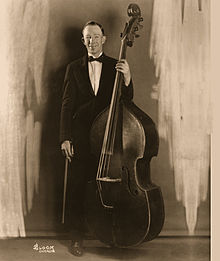Steve Brown (bass player)
Steve Brown | |
|---|---|
 | |
| Background information | |
| Birth name | Theodore Brown |
| Born | January 13, 1890 |
| Origin | New Orleans, Louisiana, US |
| Died | September 15, 1965 (aged 75) |
| Genres | Jazz |
| Occupation | Bassist |
| Instrument | String bass |
Steve Brown (January 13, 1890 – September 15, 1965) was a jazz musician best known for his work on string bass. Like many of his fellow New Orleans, Louisiana bassists, he played both string bass and tuba professionally, as the two instruments fill similar roles in different types of bands.
Brown was the younger brother of trombonist Tom Brown, and in his youth played with his brother's band in New Orleans. He was born with the name Theodore Brown, but acquired the nickname "Steve" for his devil-may-care personality, after Steve Brodie, a man who became famous for jumping off the Brooklyn Bridge on a dare. Few of his fellow musicians knew that Brown's given name had not always been Steve.
Steve Brown first went north to Chicago in 1915 with brother Tom in the first wave of jazz musicians to go to the city. He was a member of the New Orleans Rhythm Kings in the early 1920s, where his early slap-style string bass playing attracted attention. Steve Brown was one of the important pioneers of the slap-style. According to one story, he was the originator of the slap-style when the drummer failed to appear for a show. Brown threw down his bow and slapped the beat with the strings. (There are other conflicting claims for originating the style as well, notably by Bill Johnson.)
In 1924 he joined Jean Goldkette's Orchestra, with whom he remained until 1927 when he joined the top-paying band in the United States, Paul Whiteman's Orchestra.
About 1930 he settled in Detroit, Michigan, which would be his home for the rest of his life. He led his own band there for a while, and continued playing with traditional jazz and Dixieland bands there in to the 1950s.
Wellman Braud, bass player with the Duke Ellington orchestra, once called Brown "the greatest of all" bass players.
